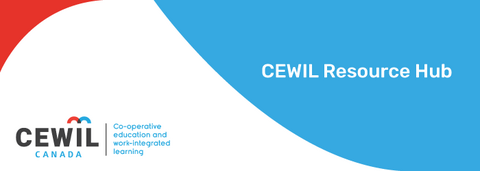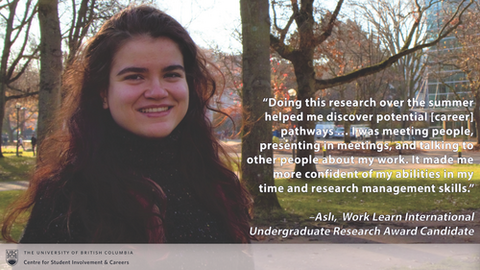Key success factors
- In addition to supporting students, the Work Learn International Undergraduate Research Award (WL IURA) program provides ongoing support to supervisors through all phases of strategic budget planning, submitting a proposal and the holistic design of a workplace experience, as well as in developing their supervisory skills.
- All WL IURA opportunities are posted on University of British Columbia CareersOnline, which gives students an opportunity to look for the role best suited to their values, interests and goals for career and/or academic learning.
- The WL IURA program works closely with the Centre for Student Involvement and Careers to align workshop offerings on career skills, increase career advising and coaching availabilities over the course of the application period, and ensure access to resources for specific student identity demographics (i.e. students with disabilities (PDF), Indigenous students, LGTBQ+ students (PDF)) as they search for opportunities.
- This program is positioned within the Workplace Learning portfolio as a key work-integrated learning experience that can support students in their career learning and development of transferable and professional skills. It shows students that they can still gain professional workplace experience through a research opportunity. This is especially important for students who want to pursue a career within the academy or within research.
Unique characteristics
- The Work Learn International Undergraduate Research Award (WL IURA) program provides high-impact research experiences for international undergraduates at University of British Columbia (UBC).
- The WL IURA program provides faculty members with low-cost funding opportunities to hire students. Faculty members must submit an application for a proposed research opportunity through UBC CareersOnline. This includes a basic outline of the research project, how this opportunity will help contribute to advancing the research, and how the experience will support the program’s student learning outcomes. These applications are reviewed centrally and by each of the committees within each of the first-year admitting faculties. The research opportunities that receive funding are posted through UBC CareersOnline and available for international undergraduate students to apply.
- The communication around this program and funding decisions are handled by representatives within each of the first-year admitting faculties at UBC.
Challenges
- The key challenges of this program are related to the cross-cultural aspects, which adds a level of complexity to the process.
- It's difficult to develop clear, mutually beneficial partnerships with placement organizations, and this work is usually done over the phone or email because of the distance.
- There's a geographical challenge associated with having students around the world; although every effort is made to keep students safe, the risks are higher.
Resources
- Supervisor (faculty/staff)-facing website
- Student story: Asli Munzur (PDF)

